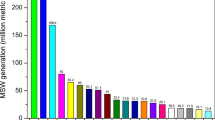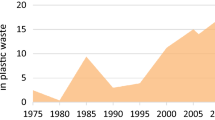Abstract
Strategies for Municipal Solid Waste (MSW) management can be sustainable only because of site-specific analyses and choices that take into account not only financial but also environmental costs. Generally, a correct approach should use different scenarios based on the environmental, social, economic and technological conditions of the specific area and on its expected potential. The aim of this paper is to presents an innovative model for the implementation of integrated MSW management approach which can result extremely useful where the MSW systems have to be refined or even designed such in the case of low-income countries. The proposed approach provides the best solid waste (SW) allocation/distribution among the available treatments and disposal options minimizing at the same time the total cost by means of an optimization procedure. The environmental impacts of potential scenarios are simultaneously estimated by means of a tailored Life Cycle Assessment procedure. The LCA tool in the model focus on the specific impacts from a SW management scenario that makes the model more explicit with respect to traditional LCA application. Additional tools allow, through site-specific numerical models, to provide also a preliminary evaluation of local impacts when required (e.g. atmospheric emissions). Such a model can be useful as a supporting tool in decision making for both governmental and non-governmental institutions involved in the planning of more sustainable eco-friendly strategies for MSW management.
Graphic Abstract







Similar content being viewed by others
References
Wilson, D.C., Smith, N.A., Blakey, N.C., Shaxson, L.: Using researchbased knowledge to underpin waste and resources policy. Waste Manage. Res. 25, 247–256 (2007)
Ghiani, G., Lagana, D., Manni, E., Musmanno, R., Vigo, D.: Operations research in solid waste management: a survey of strategic and tactical issues. Comput Oper Res 44, 22–32 (2014)
Benjamin, A., Beasley, J.: Metaheuristics for the waste collection vehicle routing problem with time windows, driver rest period and multiple disposal facilities Comput. Oper. Res. 37, 2270–2280 (2010)
Karadimas, N.V., Papatzelou, K., Loumos, V.G.(2007) Genetic algorithms for municipal solid waste collection and routing optimization. In Artificial Intelligence and Innovations From Theory to pplications, pp. 223–231. Springer
Mancini, G., Nicosia, F.G., Luciano, A., Viotti, P., Fino, D.: An Approach to an Insular Self-contained Waste Management System with the Aim of Maximizing Recovery While Limiting Transportation Costs. Waste and Biomass Valorization 8(5), 1617–1627 (2017)
Dell’Amico, M., Righini, G., Salani, M.: A branch-and-price approach to the vehicle routing problem with simultaneous distribution and collection. Transp. Sci. 40, 235–247 (2006)
Cattaruzza, D., Absi, N., Feillet, D.: Vehicle routing problems with multiple trips 4OR-Q. J. Oper. Res. 14, 223–259 (2016)
Bautista, J., Pereira, J.: Modeling the problem of locating collection areas for urban waste management. An application to the metropolitan area of Barcelona. Omega. 34, 617–629 (2006)
Alumur, S.A., Tari, I.: Collection Center Location with Equity Considerations in Reverse Logistics Networks. Infor. 52(4), 157–173 (2014)
Melo, M.T., Nickel, S., Saldanha-da Gama, F.: Facility location and supply chain management-a review. Eur. J. Oper. Res. 196, 401–412 (2009)
Costi, P., Minciardi, R., Robba, M., Rovatti, M., Sacile, R.: An environmentally sustainable decision model for urban solid waste management. Waste Manag. 24, 277–295 (2004)
Badran, M., El-Haggar, S.: Optimization of municipal solid waste management in Port Said – Egypt. Waste Manag. 26, 534–545 (2006)
Yeomans, J.S.: Solid waste planning under uncertainty using evolutionary simulation-optimization. Socio Econ. Plan. Sci. 41, 38–60 (2007)
Yadav, V., Karmakar, S., Dikshit, A.K., Vanjari, S.: A feasibility study for the locations of waste transfer stations in urban centers: a case study on the city of Nashik. India. J. Clean. Prod. 126, 191–205 (2016)
Qu, L., Zhou, Z., Zhang, T., Zhang, H., Shi, L.: An improved procedure to implement NSGA-III in coordinate waste management for urban agglomeration. Waste Manage. Res. 37(11), 1161–1169 (2019)
Ahani, M., Arjmandi, R., Hoveidi, H., Ghodousi, J., Miri Lavasani, M.R.: A multi-objective optimization model for municipal waste management system in Tehran city. Iran. International Journal of Environmental Science and Technology. 6(10), 5447–5462 (2019)
Allesch, A., Brunner, P.H.: Assessment methods for solid waste management: a literature review. Waste Manag Res 32(6), 461–473 (2014)
Gu, F., Guo, J., Zhang, W., Summers, P.A., Hall, P. 601–602, 1192–1207 (2017)
Chen, Y., Cui, Z., Cui, X., Liu, W., Wang, X., Li, X., Li, S.: Life cycle assessment of end-of-life treatments of waste plastics in China. 146, 48–357 (2019)
Fiore, S., Ibanescu, D., Teodosiu, C., Ronco, A.: Improving waste electric and electronic equipment management at full-scale by using material flow analysis and life cycle assessment. Sci. Total Environ. 659, 928–939 (2019)
De Meester, S., Nachtergaele, P., Debaveye, S., Vos, P., Dewulf, J.: Using material flow analysis and life cycle assessment in decision support: A case study on WEEE valorization in Belgium. Resour. Conserv. Recycl. 142, 1–9 (2019)
Buttol, P., Masoni, P., Bonoli, A., Goldoni, S., Belladonna, V., Cavazzuti, C.: LCA of integrated MSW management systems: Case study of the Bologna District. Waste Manage. 27, 1059–1070 (2007)
Cherubini, F., Bargigli, S., Ulgiati, S.: Life cycle assessment of urban waste management: Energy performances and environmental impacts The case of Rome Italy. Waste Manage. 28, 2552–3256 (2008)
De Feo, G., Malvano, C.: The use of LCA in selecting the best MSW management system. Waste Manage. 29, 1901–1915 (2009)
Rigamonti, L., Falbo, A., Grosso, M.: Improvement actions in waste management systems at the provincial scale based on a life cycle assessment evaluation. Waste Manage. 33, 2568–2578 (2013)
Sappa, G., Iacurto, S., Ponzi, A., Tatti, F., Torretta, V., Viotti, P.: The LCA Methodology for Ceramic Tiles Production by Addition of MSWI BA. Resources (2019). https://doi.org/10.3390/resources8020093
ISO 14042: Environmental management Life Cycle Assessment. Life cycle assessment. (1998).
ISO 14040: Environmental management Life Cycle Assessment- Principles and framework. (1997).
IPCC: Climate Change 2007: Synthesis Report. Contribution of Working Groups I, II and III to the Fourth Assessment Report of the Intergovernmental Panel on Climate Change, p. 104. IPCC, Geneva, Switzerland (2007)
Fazio, S. Castellani, V. Sala, S. Schau, EM. Secchi, M. Zampori, L., Diaconu E. Supporting information to the characterisation factors of recommended EF Life Cycle Impact Assessment method. JRC Technica Report.
Author information
Authors and Affiliations
Corresponding author
Additional information
Publisher's Note
Springer Nature remains neutral with regard to jurisdictional claims in published maps and institutional affiliations.
Rights and permissions
About this article
Cite this article
Viotti, P., Tatti, F., Rossi, A. et al. An Eco-Balanced and Integrated Approach for a More-Sustainable MSW Management. Waste Biomass Valor 11, 5139–5150 (2020). https://doi.org/10.1007/s12649-020-01091-5
Received:
Accepted:
Published:
Issue Date:
DOI: https://doi.org/10.1007/s12649-020-01091-5




